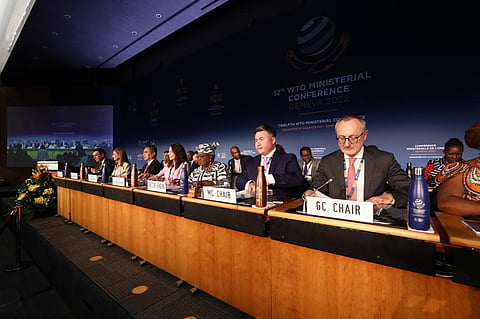

The ‘WTO Reform’ proposal, which is supposed to improve the effectiveness and functionality between countries, has been the highlight of the 12th Ministerial Conference (MC12) of the World Trade Organisation (WTO) that began June 12, 2022.
The proposal scheduled to be tabled during the conference that'll conclude on June 15 will become the first after several years of after talks and discussions.
The so-called reforms will eventually undermine the participation and say of the developing countries, a section of civil society organisation (CSO) members and experts feared.
The changes will undermine the principle of multilateralism — the very basis of the existing structure, the members alleged. The new agenda will favour plurilaterals and create differentiation among developing countries, they added. This will allow more role and authority for corporations, thereby worsening the existing failed WTO functioning model rather than bettering it, they added.
WTO has been in crisis for several years now and the reform agenda is a secretive means to curb the fundamental WTO principles of consensus and multilaterlism, said Deborah James, director of International Programs at Center for Economic and Policy Research and Facilitator of Our World Is Not for Sale global network, the United States.
“The Ministerial Outcome Document sneaks in a carte blanche for new talks on ‘WTO reform’,” she said, addressing an online press conference June 12.
Instead of addressing serious flaws with the existing harmful WTO rules, this ‘reform’ will open the doors for demands by developed countries, as evident from the WTO briefing note, the expert stated.
As CSOs united here, we reject false “WTO reform”, which is really about expanding the WTO and making it even more pro-coprorate, pro-developed countries, said Deborah.
Parminder Jeet Singh, executive-director, IT for Change, India and member of the Third World Network, said:
In the name of WTO reform, what developing countries are planning is to subvert the key principles of WTO, which are: One nation one vote, decisions by consensus and ‘special and differentiated treatment’ to protect developing country interests.
The move will give more control to powerful countries to make decisions among themselves, he added. “The Joint Statement Initiatives is about the same. The other countries then will be lured and forced to join because of the need to stay connected to the global economy.
“This is not WTO reform but WTO deform,” Singh said. The move will jettison whatever democracy and participation exists at the WTO towards complete control by the richest nations and the global corporations, he added.
Permanently abandoning the mandated, long-unresolved issues of the development agenda; attacking developing countries’ ability to access flexibilities enshrined in the WTO, without which they never would have agreed to its existence; and expanding the WTO’s monitoring function in a way that would further constrain developing countries in using their development-centered policy space, said James.
She added:
The Development Agenda is nowhere listed in the document. Instead, developed countries also want to create new mechanisms to expand the direct influence of corporations at the WTO through references to “stakeholders”.
Such “reform” tactics are ways for rich countries and their allies to put pressure and bully developing country negotiators into accepting whatever is offered to them on the table and increase the dominance of developed economics at the WTO, according to CSO members.
They are confident that any outcome portrayed as “saving the WTO” will only make the organisation more pro-corporate, rigid for development and weaken the steps taken to address the issues of inequality and climate crisis.